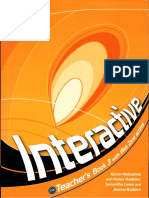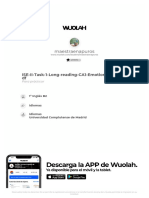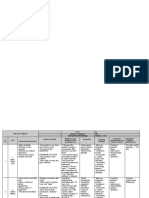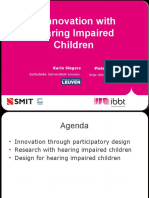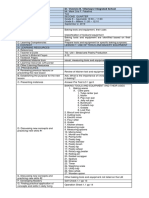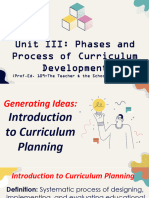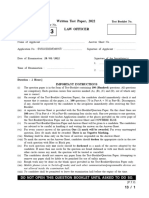Learning: Are You An Early Bird or A Night Owl?
Learning: Are You An Early Bird or A Night Owl?
Uploaded by
Roshdi AlfaouriCopyright:
Available Formats
Learning: Are You An Early Bird or A Night Owl?
Learning: Are You An Early Bird or A Night Owl?
Uploaded by
Roshdi AlfaouriOriginal Title
Copyright
Available Formats
Share this document
Did you find this document useful?
Is this content inappropriate?
Copyright:
Available Formats
Learning: Are You An Early Bird or A Night Owl?
Learning: Are You An Early Bird or A Night Owl?
Uploaded by
Roshdi AlfaouriCopyright:
Available Formats
11a Training
Learning
• Reading: Find specific information (Short-answer
questions)
• Language development: Present simple
• Vocabulary: Studying
• Listening: Predict answers (Section 1: Notes completion)
• Speaking: Introductions; Use a range of vocabulary
(Part 1: Introduction and interview)
• Writing: Introduce advantages and disadvantages
(Task 2: Advantages-disadvantages essay)
Are you an early bird or a night owl?
1b Testing
• Vocabulary: Higher education1
• Listening: Section 1: Notes completion
• Language development: Present simple with adverbs of
frequency; can for ability, possibility and permission
• Reading: Short-answer questions
• Writing: Task 2: Advantages-disadvantages essay
• Speaking: Part 1: Introduction and interview
s
ge
We asked 100 people, ‘At what time of day do
you feel most productive? Most creative?’
pa
61%
59%
Most productive
e
63 Percentage of people
pl
Most creative
who feel most
productive
m
in the morning
Sa
21%
72
16% 16%
12%
Percentage of people
11%
who feel most
4% creative
in the morning
8.00–12.00 12.00 –18.00 18.00–22.00 Don’t know
productive = making things in large quantities or producing a good result creative = using imagination to produce new ideas or things
Lead-in
Discuss the questions.
1 Look at the infographic. At what time of day are people:
• most productive? • least productive? • most creative? • least creative?
2 At what time of day are you most/least productive? Most/Least creative?
M01_EXP_SB_01GLB_5190_U01.indd 7 09/02/2017 16:34
1a Smart learners
Reading (Short-answer questions)
Before you read c Match each question in Exercise 3b with the kind
of information you need to find.
1 Work in pairs and discuss the questions.
A a person or people
1 Do you think you are a good learner? Why/
B an activity or a thing
Why not?
C a feeling
2 Do you think good learners share particular
characteristics? If so, what characteristics are d Work in pairs. Look at question 1 in Exercise 3b
typical of good learners? and follow these steps to answer it. Use no more
than three words in your answer.
Find specific information 1 Which part of the passage contains the answer?
2 Read the passage quickly and choose the correct 2 What is the correct answer?
answers. 3 Which words in the passage reflect the words in
the question (never stop trying to do)?
1 What is the purpose of the passage?
4 Check the number of words. If there are more
A to give instructions
than three words, what can you leave out?
B to give an opinion
s
C to give advice
2 Who wrote the passage?
Test training
A a student
B a psychologist
C a teacher
4
ge
Answer questions 2–5 in Exercise 3b. Follow
the steps in Exercise 3d for each question.
Remember that you should:
pa
3 a Read the passage again. Match these key ideas • use no more than three words in each answer.
(1–5) with the paragraphs (A–E). • use only words from the passage.
1 Good language skills are important.
2 Study can sometimes be boring.
Task analysis
e
3 Good learners always have new questions. 5 Work in pairs and discuss the questions.
4 Good learners think about their studies in their
pl
1 How did reading the whole passage first help you
free time. to find where the answers were?
5 Good learners realise there is a link between new 2 Did the questions follow the order of the passage?
m
and old knowledge. 3 Which words in the questions helped you
b Read these questions about the passage and understand what to look for?
4 Do the key words in the questions repeat the
Sa
underline the key words. Then compare with
a partner. words in the passage?
Discussion
1 What do good learners never stop trying to do?
2 How do good learners feel about their chances 6 Work in pairs and discuss the questions.
of finding the answer to a study problem? 1 Which of the characteristics in the passage do you
3 What makes doing boring learning tasks already have?
worthwhile? 2 How do you think you can help yourself to
4 What do good learners modify as they learn become a better learner?
more? 3 Which of the characteristics in the passage do you
5 Who can good learners explain new knowledge think are important for students studying English?
to in an appropriate way? Are there any other characteristics that you think
are important?
8 Student’s Resource Book > Reading pages 6–7 MyEnglishLab > 1a Reading
M01_EXP_SB_01GLB_5190_U01.indd 8 09/02/2017 16:34
Module 1
Learning 1a
Who makes a good learner?
An experienced university teacher has put together a list of the psychological
characteristics that good learners have.
s
ge
pa
e
A Good learners are curious. They wonder about D Good learners make knowledge their own. This
pl
all sorts of things. They love the discovery part is about making the new knowledge fit with
of learning. Finding out about something gives what the learner already knows. Good learners
them an intense satisfaction. But their curiosity is have to change and adapt their knowledge
m
addictive, so they always want to find out more. structures in order to make room for what they
are learning. In the process, they build a bigger
B Good learners work hard. A few things may
Sa
and better knowledge structure. It is not enough
come easily to learners, but most knowledge
to just take in new knowledge. It has to make
requires effort and good learners are willing
sense, to connect in meaningful ways with what
to put in the time. They talk with others, read
the learner already knows.
more, study more and carry around what they
do not understand, thinking about it before E Good learners share what they have learned.
they go to sleep, at the gym, on the bus. Good Unless knowledge is passed on, it is lost. Good
learners are persistent. When they fail, they learners love sharing what they have learned. They
carry on, confident that they will figure it out write about it and talk about it. Good learners can
eventually. In the meantime, they learn from explain what they know in ways that make sense
their mistakes. to others. They are not trapped by specialised
language. They can find examples that make what
C Good learners recognise that learning is not
they know meaningful to other learners.
always fun. But that does not change how much
they love it. Understanding the topic, when they
finally get there, makes it all worth doing. But
the journey to understanding is not generally all
that exciting. Some learning tasks require boring
repetition; others a mind-numbing attention
to detail; still others involve periods of intense
mental focus.
M01_EXP_SB_01GLB_5190_U01.indd 9 09/02/2017 16:34
1a Module 1
Learning
b Work in pairs. Talk to your partner about the
Language development sentences in Exercise 4a. Give more information.
Present simple My first language isn’t English – it’s Chinese.
hh
EXPERT GRAMMAR page 183
5 Complete the text with the present simple form
1 Match the sentences (1–3) with what they of the verbs in brackets. Use short forms where
express (A–C). possible.
1 We work in teams most of the time.
2 My brother works in Berlin.
3 The course lasts three years.
A a fact that is always true
Reading skills at university
B a habit or repeated action
C a permanent situation/state
2 Complete the sentences with the present simple
form of the verbs in brackets.
1 It (be) sometimes hard to organise your
work at university.
2 They (have got) a lot of reading to do on
s
this course.
If you have to do a lot of reading at university, you
3 We really (enjoy) the lectures on this
ge
1 (need) different reading skills than those
subject. you use when you read for pleasure. One important
4 She usually (study) in the library. thing to remember, especially if you read in a second
5 He always (help) me with my writing. language, is that it 2 (not matter) if you 3
pa
6 You (remember) facts very well. (not understand) everything and that it’s not always
7 Sam (watch) the lectures online. necessary to read a text in great detail. The reading skill
8 He (carry) his laptop with him everywhere. you use 4 (depend) on your reason for reading.
9 The university (have got) good sports Skimming and scanning 5 (be) both useful fast
e
facilities. reading techniques, but they 6 (not have) the
10 I (be) very good at maths but my sister same purpose. Skimming 7 (be) to get a general
pl
(be) better at languages. idea of a text, while scanning 8 (allow) us to find
specific information. Some texts 9 (need) more
3 a Find and correct the mistakes in seven of the careful reading to get a deeper understanding, perhaps
m
questions. by asking questions about the content and taking notes.
1 How you travel to work or college? Using different reading skills successfully 10
2 How many people there are in your family?
Sa
(take) practice, but is worth the effort.
3 Where does your family lives?
4 What you like about your home town?
5 Your house is big or small?
6 Is there anything about your English course you
don’t like? 6 Work in pairs. Tell each other about your typical
7 You have any hobbies? study day. Use the verbs/phrases in the box
8 You are good at sport? to help you. Ask your partner at least three
b Work in pairs. Take turns to ask and answer the questions about his/her day.
questions in Exercise 3a. discuss with friends do homework go to classes
4 a Are these sentences true for you? If not, make go to lectures go to the library read study
them true by making the verb negative. take a break use a computer write
1 My first language is English.
2 I’m very good at tennis. Do you study in the library?
3 Most of my friends are British.
4 I’ve got a very big family.
5 I enjoy reading in another language. Sometimes, but I usually study at home.
6 My best friend lives in Canada.
7 I study very hard every evening.
8 My house has got ten bedrooms.
10 Student’s Resource Book > Language development page 8 MyEnglishLab > 1a Language development
M01_EXP_SB_01GLB_5190_U01.indd 10 09/02/2017 16:34
Module 1
Learning 1a
Collocations
Vocabulary
2 Choose the options in italics which cannot be
used with the nouns in bold.
Studying 1 For your next piece of work, you need to write /
1 a Match the words in the box with their meanings do / carry out some research.
(1–10). 2 I’m going to do / make / give a presentation on
my home country.
assignment course essay examination grade 3 How many exams do you have to take / make /
presentation project report research term do this year?
1 a piece of work that someone gives you to do 4 I need to get / do / have very good grades to do a
2 a piece of planned work that is done over a medical degree.
period of time 5 In the exam, we have to write / do / carry out two
3 an event at which someone explains an idea to a essays before the end of term.
group of people 6 Can you finish / complete / make your assignment
4 a piece of writing that gives facts about a situation by the end of this week?
or event 7 It’s difficult to produce / make / write the report
5 a mark that your teacher or tutor gives you without the necessary information.
6 a spoken or written test of knowledge 8 You need to work together in order to complete /
7 a piece of writing about a particular subject carry out / have this project.
8 detailed study of a subject to find out new 3 Complete the collocations with the verbs in the
s
information box.
9 a set of lessons in a particular subject
ge
ask do give have prepare take
10 one of the three parts of a school, college or
university year 1 revision 4 questions
b Choose the correct options in italics to complete 2 for a test 5 notes
pa
the text. 3 a discussion 6 your opinion
4 Complete the sentences with collocations from
Exercises 2 and 3.
1 I need to do research for my assignment.
e
2 Use phrases like I think and I believe to .
pl
3 I am very nervous because I have to in
front of 50 people.
4 I find it difficult to when I listen to a
m
lecture.
Midlands College International 5 I can’t go out – I have to a maths .
Foundation Course
Sa
6 After my presentation, I asked the audience if they
would like to .
Academic English Module
The Academic English module aims to prepare students Skills
for higher education at an English speaking university.
There are four 1 courses / assignments over three terms, 5 a Work in pairs. Match the skills (1–6) with the
followed by two final 2 examinations / grades of three examples of activities (A–F). Can you think of
hours each at the end of Term 3. any more examples?
Term 1 1 practical skills A creating reports
• Students write a 3 research / report based on 2 management skills B using Excel
information collected from a questionnaire and 3 computer/IT skills C being a good listener
interviews. 4 reading/writing skills D typing
• Students write a 1,000-word 4 essay / research on a
5 people skills E speaking French
given topic.
6 language skills F being a good leader
Term 2
Students give an academic 5 essay / presentation on a b Work in groups and discuss the questions about
subject of their choice. the skills in Exercise 5a.
Terms 2 and 3 1 Which three skills do you think are important for
• Students complete a group 6 report / project by success at work today? Why? Put them in order
carrying out 7 examinations / research into a given of importance.
academic topic. 2 Which are your three best skills?
• Students will receive their final results and 8 grades /
assignments at the end of July.
Student’s Resource Book > Vocabulary page 9 MyEnglishLab > 1a Vocabulary 11
M01_EXP_SB_01GLB_5190_U01.indd 11 09/02/2017 16:34
1a Module 1
Learning
Test training
Listening (Section 1: Notes completion)
3 a Read the test task. Think about what kind of
information goes in each gap.
Before you listen
1 Work in pairs and discuss the questions. Complete the notes below. Write NO MORE THAN
TWO WORDS AND/OR A NUMBER for each answer.
1 Which of these do you often have problems with?
• writing essays
• preparing for presentations Meeting with Student Services Advisor (Lin Wood)
• handing work in on time • Organise time: make a 1 for revision.
• revising for exams • Practise past exam papers.
• managing your study time • Start a 2 with other students.
2 Who do you talk to if you have a problem with • Take regular study breaks: 3 every hour.
your studies? • Make time for 4 , e.g. sport.
• a friend • Lin’s working hours: every morning and
• a family member 5 afternoons
• your personal tutor • Contact number: 6
• somebody else?
Predict answers b 1.2 Complete the test task.
2 a Look at the notes. What is the situation? Who are
s
the two people talking?
Task analysis
ge
4 Work in pairs and discuss the questions.
1 Did the questions follow the same order as the
Record of tutorial recording?
pa
2 Did you correctly predict the type of information
Date: 27 March for each gap?
Student’s name: Rashad Al-Hashimi 3 Did you check the number of words you used for
each answer?
Topics discussed: • presentation
e
• essay feedback Discussion
• advice about 1
pl
5 Work in pairs and discuss the questions.
Action points: • attend talk with 2 1 Do you think Lin’s advice is helpful?
(Tuesday at 3 )
m
2 Can you think of any other advice to help a
• arrange meeting at 4 student prepare for exams?
at 10.30 a.m.
Sa
Next tutorial: 5
b Decide what kind of information goes in each
gap in Exercise 2a. Use the words before and
after each gap to help you.
A a date
B a time
C a name
D a place
E a topic
c 1.1 Complete the notes in Exercise 2a with
the words in the box. Then listen and check.
17 April 3.15 p.m. Dr Green exams Student Services
12 MyEnglishLab > 1a Listening
M01_EXP_SB_01GLB_5190_U01.indd 12 09/02/2017 16:34
Module 1
Learning 1a
Speaking (Part 1)
Introductions 1 a When you first meet someone, what do you like to find out
about them?
• their home town • their work or studies
• their family • something else?
b 1.3 Listen to two students meeting each other. Which of the
topics in Exercise 1a do they talk about? What other topics do
they discuss?
2 a 1.3 Listen again and complete the questions.
1 you like the course so far?
2 do you live?
3 do you travel to classes?
4 do you live with?
5 you do a lot of sport?
6 type of films do you like?
Pronunciation: connected b 1.4 Listen again to the questions in Exercise 2a. How do the
s
speech speakers pronounce do you?
c Practise saying the questions in Exercise 2b.
Use a range of vocabulary
ge
3 a Look at audio script 1.3 on page 210. Which of the adjectives in
the box do the speakers use to describe:
pa
• their course? • their accommodation? • meeting people?
boring cheap comfortable convenient difficult easy expensive
fantastic great hard interesting modern quiet small
e
b Work in pairs. Imagine you are just meeting each other. Take
pl
turns to ask and answer the questions in Exercise 2a. Try to
use as many of the adjectives in Exercise 3a as possible in your
answers.
m
Test training 4 a Write some questions to ask your partner about their home town
Sa
and family. Use the words and phrases below to help you.
• Do you … ? • How often (do you) … ?
• What (do you) … ? • How many ...?
• Where (do you) … ? • Why?
b Work in pairs. Take turns to ask and answer your questions from
Exercise 4a. Remember to use adjectives in your answers.
Task analysis 5 Work in pairs and discuss the questions.
1 Were some questions more difficult to answer? Which ones? Why?
2 Did you give short answers or did you add extra information?
3 Did you use weak forms of do you in your questions?
4 Which adjectives did you use in your answers?
MyEnglishLab > 1a Speaking 13
M01_EXP_SB_01GLB_5190_U01.indd 13 09/02/2017 16:34
1a Module 1
Learning
Writing (Task 2) Going to university can be very expensive and so
many students decide to work while they are studying.
What’s in an essay? The main advantage of working while studying
is earning money. A salary allows students to pay
1 Choose the correct answers. You must choose for their living accommodation, their food, their
more than one option in two questions. books and their fees. As a result, they do not need
1 What is an essay? to borrow money from the bank or from their
A a description of an event or experience, giving parents. Another advantage is that it gives students
a personal view experience of working. This looks very good on their
B a piece of writing about a particular subject, CV when they leave college.
usually with the writer’s own opinions
C a piece of writing that gives facts and details One disadvantage is that it is hard to work at the
about a situation or an event same time as studying. Work can make people feel
2 Who might we write an essay for? very tired, and this means it is difficult for students
A a friend or relative to make themselves read a textbook or work on an
B an unknown audience assignment when they get home after work. Another
C a tutor or lecturer problem is that having a job means there is simply
3 Which of the following do you find in an essay? much less time available for study. Working students
A an introduction may not be able to complete their assignments as
B a conclusion well as full-time students and so get poor marks.
s
C a main idea
D lots of difficult vocabulary Overall, in my opinion, it is a good idea to work
ge
and study at the same time. Working gives students
2 a Read the writing task and underline the key valuable experience, which makes it easier for them
words. Then choose the correct answer in the to find a job afterwards. However, they need to be
question below.
pa
very good at organising their time so they can still
read all the books on their reading list and hand in
Many students work while they are studying. well-written assignments.
What are the advantages and disadvantages of
working while you study?
e
Introduce advantages and disadvantages
pl
What do you need to write about? 3 Look at the phrases in the box for introducing
A the difficulty of studying advantages and disadvantages. Which ones does
the student use in the model answer?
m
B how study prepares you for work
C working and studying at the same time
One advantage/disadvantage is …
b Work in pairs. Follow the steps below. The main advantage/disadvantage is …
Sa
1 Think of one advantage and one disadvantage you Another advantage/disadvantage/problem is …
could include in your essay.
2 Discuss your ideas with another pair. 4 Write sentences for the essay about the
3 Read the model answer. Does it mention any advantages and disadvantages of working and
of your ideas? What other advantages and studying at the same time. Use your ideas from
disadvantages does it mention? Exercise 2b and the phrases in Exercise 3.
14 Student’s Resource Book > Writing page 10 MyEnglishLab > 1a Writing
M01_EXP_SB_01GLB_5190_U01.indd 14 09/02/2017 16:34
1b Studying at university
Listening (Section 1: Notes completion)
Before you listen 1 Work in groups and discuss the questions.
1 What decisions do you and/or your family have to make during
your education?
2 How did you choose the course or subject(s) you study? Was it
difficult to decide? Who helped you decide?
Test practice 2 Work in pairs. Read the test task and answer the questions.
hh
TEST STRATEGIES page 178 1 Who do you think is talking?
2 How many words should you write in each gap?
3 What kind of information do you need for each gap?
Questions 1–8
Complete the notes below. Write ONLY ONE WORD OR A NUMBER for
each answer.
s
Course options
ge
• Engineering: need high grade in 1
• Economics and business studies: need high level of 2
hh
HELP • Business studies course: three days of 3 and two days in
pa
a company
1 Listen for a subject.
• Course organiser has contacts with local 4
3 Listen for an example of something • Speak to Professor 5 in Room 6
you might do on a course. • Business school talks by guest speakers: ring 7 to book
5 Listen for a name. • Final decision by end of 8
e
7 Listen for a telephone number.
pl
3 1.5 Complete the test task.
m
Task analysis 4 Work in pairs and discuss the questions.
1 Did you correctly predict the type of information for each gap?
Which answers were easier to predict? Which were more difficult?
Sa
2 Look at audio script 1.5 on page 210 and underline the correct
answers. Which key words in the listening helped you find the answers?
Discussion 5 Work in pairs and discuss the questions.
1 Is it better to make important decisions on your own or is it better
to ask other people? Why?
2 Do the decisions you make about your education have an effect on
your future career? In what way?
Student’s Resource Book > Listening page 11 MyEnglishLab > 1b Listening 15
M01_EXP_SB_01GLB_5190_U01.indd 15 09/02/2017 16:34
1b Module 1
Learning
can for ability, possibility and permission
Language development
4 Look at these sentences with can/can’t. What
does each one express? Write A for ability, PO for
Present simple with adverbs of frequency possibility or PE for permission.
hh
EXPERT GRAMMAR page 183 1 Can I borrow your laptop?
2 I can’t speak French or German.
1 Write the adverbs in the box in the correct place 3 You can ask your tutor for help with references.
on the scale.
4 You can read about the course on our website.
always never normally/usually occasionally often
rarely sometimes
5 I’m sorry, I can’t help you with that.
6 Can I come in?
all the time
always 5 Rewrite the sentences using can or can’t.
1 I am not able to speak French very well but I am
able to understand it a little.
I can’t speak French very well but I can understand it a little.
2 We’ve got permission to leave the lecture early.
3 Do you think Xi is able to help us with this
assignment?
4 Some people don’t have the ability to read quickly.
s
5 It’s not possible for you to study economics
ge
never without a good grade in maths.
6 Are you able to hear what’s she’s saying?
7 They haven’t got permission to use the computers
not at all in the library.
pa
8 It’s not possible for you to see Professor Gibson
2 Rewrite the sentences putting the adverb in the now. Is it possible for you to come back later?
correct place. 9 Some people are not able to work in a team.
1 Lectures start at nine. (usually) 10 Do you have permission to use material from the
e
Lectures usually start at nine. college website?
2 We don’t study in the library. (often) 6 a Look at this list of skills and activities. Add three
pl
3 She’s late for class. (rarely) more ideas of your own.
4 He goes to the library at 8 a.m. (always) • play a sport well
m
5 Do you write reports? (often) • give an academic presentation
6 I am confused by the lectures. (sometimes) • speak another language (apart from English and
7 He doesn’t fail exams. (normally)
Sa
your first language)
8 They have to give presentations. (occasionally) • write essays in English
9 We write essays. (rarely) • sing
10 He goes to tutorials. (never) • read quickly
3 a Put the words in the correct order to make • play a musical instrument
sentences. • use research skills
1 grades / get / often / for / assignments / I / bad • drive
2 interesting / lectures / usually / my / are / very •
3 have to / I / give / sometimes / a presentation •
4 at / study / I / rarely / weekends •
5 in / always / library / study / Fridays / on / I / the b Work in pairs. Take turns to ask and answer
6 have / homework / to / never / I / do / any about the skills and activities in Exercise 6a.
7 exams / do / I / occasionally
8 research / online / I / do / normally Can you play a sport well?
b Make the sentences in Exercise 3a true for you.
Then talk to your partner. Add extra information.
I can play basketball quite well, but
I can’t play many other sports.
I rarely get bad grades for assignments
but I occasionally get a bad mark for
maths – it’s very difficult!
16 Student’s Resource Book > Language development page 12 MyEnglishLab > 1b Language development A and B
M01_EXP_SB_01GLB_5190_U01.indd 16 09/02/2017 16:34
Module 1
Learning 1b
Subjects
Vocabulary
2 a Complete the sentences with the words in the
box.
Higher education
accountancy architecture business studies
1 a Write the words in the box in the correct place in computer science dentistry economics engineering
the table. law medicine
admissions office advisor campus classmate 1 A degree in involves designing and
department faculty laboratory lecturer library building things like machines, roads and bridges.
professor tutor 2 To study , you need to be creative and
good at art and design.
Places People 3 A degree in is not just about looking after
teeth; you also study general health of the human
body.
4 is a difficult degree course and you need
to be able to think clearly and be good at essay
b Match the words (1–5) with their meanings (A–E). writing.
1 degree 5 Many banking, sales and marketing jobs require a
2 undergraduate degree in or .
3 post-graduate 6 If you want to get a job keeping financial records,
s
4 PhD you need to study .
5 MBA 7 In the digital age, when technology is so
ge
important, it is usually easy to get a job with a
A a student at university studying for their first degree degree in .
B a higher university degree in research in a 8 You need to get excellent grades in science
particular subject
pa
subjects to do a degree in and it can take
C what you get when you successfully finish any years to become qualified.
university course
D a higher university degree in business b Work in pairs. Which of the subjects in Exercise
E a student at university who has already done a 2a do you find interesting? Why?
e
degree
Collocations
pl
c Complete the text with the correct form of words
from Exercises 1a and 1b. 3 a Choose the correct options in italics to complete
the questions.
m
About Brindel University 1 What do you do if you pass / miss a lesson?
2 How do you feel when you make / do a mistake
Our 1 is set in a green area outside the city. when speaking English?
Sa
Each 2 has its own building, but the science 3 Would you like to do / get a course in a language
departments share a large 3 for research apart from English? If so, which one?
and projects. Please refer to our interactive map. 4 What’s the best way to make / do progress when
The 4 is in the centre of the campus; it is learning a language?
open every day for borrowing and returning books 5 How many lessons or lectures do you go / attend
from 8 a.m. to 9 p.m. but online access is 24 hours. every week?
We offer a range of 5 at undergraduate and 6 What do you find difficult about making / doing
post-graduate level. Your personal 6 can assignments?
help you with your choice. Please contact the 7 Have you ever failed / lost an exam?
7 with any questions you have about entry 8 What was the last exam you wrote / passed?
requirements. b Work in pairs. Ask and answer the questions in
Exercise 3a.
What do you do if you miss a lesson?
I usually call a friend and ask
if I can borrow their notes.
Student’s Resource Book > Vocabulary page 13 MyEnglishLab > 1b Vocabulary 17
M01_EXP_SB_01GLB_5190_U01.indd 17 09/02/2017 16:34
1b Module 1
Learning
Reading (Short-answer questions)
Before you listen 1 Work in pairs. What do you think students learn about on a
business degree course?
2 You want to carry out a survey of students doing a business
course. Which four of the below would you choose to ask about?
What questions would you ask?
• their reasons for studying business
• what they study on their course
• whether their course includes any practical work experience
• which part of their course they like best
• what useful skills their course gives them
• their plans for the future
Test practice 3 a Read the test task and underline the key words.
hh
TEST STRATEGIES page 179
Questions 1–6
Answer the questions below. Choose NO MORE THAN TWO WORDS
s
from the passage for each answer.
hh
HELP
ge
1 What do most business students expect to get after graduating?
2 Look for a phrase which shows that 2 What do students on an MBA course need?
something is necessary. 3 Which aspect of a business degree do students prefer?
pa
3 Be careful: the passage mentions two 4 How long do most business students usually spend on a work
aspects and talks about the one that placement?
students do not prefer. You need the 5 What type of business department do most students plan to
other one for your answer. work in?
6 Who thinks business graduates have good presentation skills?
e
4 Look for a word that has a similar
meaning to usually.
pl
b What kind of information do you think the answer to each
question will be (e.g. a person, a time, a quality)?
m
4 Complete the test task.
Task analysis
Sa
5 Look at the key words you underlined in the questions. Which
words in the passage helped you find your answers? Compare
your ideas with a partner.
Discussion 6 Work in pairs and discuss the questions.
1 Which do you think is the most useful part of a business degree:
the theory or the practical work? Why?
2 How valuable is practical work experience:
• for the students?
• for the company that employs them?
3 Do you think it is better to study business as an undergraduate or
as a professional with some years of experience? Why?
18 MyEnglishLab > 1b Reading
M01_EXP_SB_01GLB_5190_U01.indd 18 09/02/2017 16:34
Module 1
Learning 1b
International survey of
business courses
A recent international survey of business degrees
shows that business and related subjects – such
as accounting and economics – are among the most
through case studies, problem-solving tasks and
project work. They also often have the chance
during their course to spend a period of time –
popular courses at universities worldwide. Students say typically three months but it can be up to one year –
that they choose these courses because business has actually working in a company.
an impact on almost every aspect of modern society.
They also believe that a business degree makes it easy The survey also shows that the majority of students
to find a job. Business graduates often earn a good plan to go into a career in business. There are, of
salary although very few of the students in the survey course, many different types of business career.
give that as their reason for studying business. Only a relatively small percentage of students
plan to set up their own business. Some aim to
s
The term ‘business degrees’ includes a wide variety work in finance departments, others in advertising
of courses; some are specialised and others are more and still more in sales. Human resources and
ge
general; some are very academic and others focus business consultancy are also options which some
on practical professional development. There are also graduates consider.
different levels of degree. Most business students are
A few students who study business decide that
pa
undergraduates. However, there are also large numbers
of business students on post-graduate courses. it is not after all the career for them. However,
Professional qualifications such as MBAs are only for their degree is still a very useful qualification. The
people who already have some business experience. international survey also reports on interviews with a
range of employers. These say they like the fact that
e
The study shows that all types of business degree look business graduates are excellent team workers and
at both theory and practice. Of these two parts of a can present information well both in writing and in
pl
course, the theoretical aspect is less popular with most front of an audience. These are valuable skills in all
students although all agree that it is an essential part workplaces. The survey concludes that choosing to
m
of a good degree course. Students look at practice study business can be a very good decision.
Sa
19
M01_EXP_SB_01GLB_5190_U01.indd 19 09/02/2017 16:34
1b Module 1
Learning
Writing (Task 2)
s
ge
pa
e
Lead-in 1 Work in pairs and discuss the questions.
pl
1 Which of the extra-curricular activities in the photos would you like
to get involved in?
m
2 What skills do you think these activities might give you?
3 How could these skills help you in the workplace?
Sa
Understand the task 2 a Read the test task and choose the correct answer in the question
hh
EXPERT WRITING page 200 below.
Write about the following topic.
Many students like to get involved in extra-curricular activities at
university such as social clubs or sports.
What are the advantages and disadvantages of this?
Give reasons for your answer and include any relevant examples from
your knowledge or experience. Write at least 250 words.
What do you need to write about?
A the good and bad points of doing extra activities
B an extra activity that is good for students
C an extra activity that is not good for students
D your experience of doing extra activities at university
b Underline the parts of the essay question that helped you answer
the question in Exercise 2a.
20
M01_EXP_SB_01GLB_5190_U01.indd 20 09/02/2017 16:34
Module 1
Learning 1b
Plan your essay 3 a Read the model answer. Match the parts of the essay (1–4) with
the paragraphs (A–D).
1 the disadvantages 3 the conclusion
2 introducing the topic 4 the advantages
A As well as studying hard at university, there are many opportunities to do extra-
curricular activities while you are there. There are all sorts of different clubs that you can
join, for example.
B In my view, the main advantage of doing extra-curricular activities is that you make a lot
of friends. You get on well with each other because you share the same interest. Another
advantage is that you can learn a new skill – how to ski or fly a helicopter, for example –
relatively cheaply. Obviously, it is a good idea to make the most of that opportunity.
C There are also disadvantages. One disadvantage is the fact that doing extra-curricular
activities can take a lot of time away from your studies. It is easy to take on too many new
things and this means you do not have enough time to go to the library or write your
assignments. You have to find the right balance between study and fun. Another problem
is that doing extra-curricular activities means you do not have the time to do a part-time
job. This means that you can finish university with big debts.
D My personal opinion is that taking part in extra-curricular activities is a good thing. It is
an opportunity to develop old interests and to take up new ones, and it is one of the best
ways of making close friends while you are at university.
s
ge
b Read the model answer again and answer the questions.
1 Does it answer the question in the task?
2 Which advantages and which disadvantages does it mention?
pa
c Work in pairs. Think of two advantages and two disadvantages
you can include in your essay. Make notes in the table.
Advantages
e
pl
Disadvantages
m
Sa
Language and content 4 a Look at paragraphs B and C in the model answer. Find the parts
where the student explains their answer. Find one point that
explains or supports each advantage and disadvantage.
b Work in pairs. Look at your plan in Exercise 3c. Think of one
supporting point for each advantage and disadvantage. Add them
to your plan.
Write your essay 5 Write two paragraphs for the essay in Exercise 2a: one discussing
hh
TEST STRATEGIES page 181 the advantages and one the disadvantages. Use your plan from
Exercise 3c. Remember to:
• introduce each advantage and disadvantage using appropriate phrases.
• include a supporting point for each advantage and disadvantage.
• write about 150 words.
Assess and improve 6 Check your work. Did you do these things in your paragraphs?
1 I included at least two advantages.
2 I included at least two disadvantages.
3 I used phrases to introduce each advantage and disadvantage.
4 I included a supporting point for each advantage and disadvantage.
Student’s Resource Book > Writing page 14 21
M01_EXP_SB_01GLB_5190_U01.indd 21 09/02/2017 16:34
1b Module 1
Learning
d Work in pairs. Tell each other what you think
Speaking (Part 1) about these things. Use phrases from Exercise
2c. Remember to give reasons for your opinions.
Use a range of vocabulary • a course you are studying
• a film you like
1 a Think about a course or subject you are • a sport you enjoy
studying. How many different adjectives can you • a town or city you like
think of to describe it?
b 1.6 Listen to a candidate doing Part 1 of the I think … is a beautiful and interesting city
Speaking test and answer the questions. because it has many historic buildings
1 What topic is he talking about? and lots of green parks.
2 Which sentence best describes the students’
answers?
A He uses the same words all the time to say Test practice
what he thinks about something.
B He avoids repeating the same words in his hh
TEST STRATEGIES page 182
answers by using a range of vocabulary. hh
EXPERT SPEAKING page 194
c Look at audio script 1.6 on page 211. Find and
underline the adjectives the candidate uses.
3 Work in pairs. Follow the instructions and
complete the test task. Then swap roles.
s
Give opinions • Student A: Ask the questions. Listen carefully to
help your partner afterwards.
ge
2a 1.6 Listen again and complete the sentences • Student B: Answer the questions.
with the phrases the candidate uses to give his
opinions.
1 What do you study?
pa
1 the course is quite exciting.
2 Do you enjoy it?
2 Well, , it’s quite hard work. 3 Is there anything you don’t like about it?
3 you can ask as many questions as you’d
4 What is the most interesting thing about your
like to.
course?
4 Mainly because I can get a good job when
e
I finish.
5 , it’s quite easy to get jobs in engineering.
pl
Assess and improve
b Look at audio script 1.6 on page 211. What words
and phrases does the student use to give reasons 4 Work in pairs. Ask your partner to tell you if you
m
for his opinions? did these things in your answers.
c Write the phrases from Exercises 2a and 2b in 1 Did you use a range of vocabulary? Which
Sa
the table. adjectives did you use?
2 Did you give your opinions? Did you use
Giving opinions Giving reasons for appropriate phrases to introduce them?
opinions 3 Did you give reasons for your opinions? Did you
use appropriate phrases to introduce them?
22 Student’s Resource Book > Speaking page 15 MyEnglishLab > 1b Speaking
M01_EXP_SB_01GLB_5190_U01.indd 22 09/02/2017 16:34
You might also like
- Interactive 3 Teacher S Book PDFDocument126 pagesInteractive 3 Teacher S Book PDFmoura_81096345867% (3)
- Academic Writing Book IIDocument148 pagesAcademic Writing Book IIAshley RaynoldNo ratings yet
- LP - Phonics - Week 4Document2 pagesLP - Phonics - Week 4ARCHANNA NAIRNo ratings yet
- LP Cambridge Week 15Document2 pagesLP Cambridge Week 15ARCHANNA NAIRNo ratings yet
- Peer Training Core Communication SkillsDocument136 pagesPeer Training Core Communication SkillsGatot SandyNo ratings yet
- Alphabetics For Emerging Learners Building Strong Reading Foundations in PreK (Mesmer, Heidi Anne E.) (Z-Library)Document157 pagesAlphabetics For Emerging Learners Building Strong Reading Foundations in PreK (Mesmer, Heidi Anne E.) (Z-Library)Valentina Cors SandagordaNo ratings yet
- Ngoc - Ga 10 TD U4Document37 pagesNgoc - Ga 10 TD U4Thảo DaisyNo ratings yet
- Module 1: Personal Development: 1.1: Examples of Values, Beliefs & Desirable QualitiesDocument8 pagesModule 1: Personal Development: 1.1: Examples of Values, Beliefs & Desirable QualitiesRhea Joy Orcio100% (2)
- A Invasive Species Teacher Published SampleDocument13 pagesA Invasive Species Teacher Published SamplechoshevaaNo ratings yet
- Lesson Plan: Subject: Moral Topic: Be Safe Week: 1 (IRISES) Date: 3-7 January 2022Document2 pagesLesson Plan: Subject: Moral Topic: Be Safe Week: 1 (IRISES) Date: 3-7 January 2022ARCHANNA NAIRNo ratings yet
- 21 Secrets To Becoming A Good Speaker: Kai-Fu Lee Corporate Vice President Microsoft CorporationDocument75 pages21 Secrets To Becoming A Good Speaker: Kai-Fu Lee Corporate Vice President Microsoft CorporationFaqeer Ul UmmiNo ratings yet
- DLL w4Document4 pagesDLL w4Roseann EnriquezNo ratings yet
- English Language: Daily Lesson PlanDocument2 pagesEnglish Language: Daily Lesson PlanMarc AL MurobbiNo ratings yet
- Full download Alphabetics for Emerging Learners Building Strong Reading Foundations in PreK 1st Edition Mesmer pdf docxDocument71 pagesFull download Alphabetics for Emerging Learners Building Strong Reading Foundations in PreK 1st Edition Mesmer pdf docxothmenstonerNo ratings yet
- Employability Skills Survey 2014Document4 pagesEmployability Skills Survey 2014Khalil AmirthaNo ratings yet
- Cuadernillo Senderos 6 Lección 1Document24 pagesCuadernillo Senderos 6 Lección 1Natalia Romero QNo ratings yet
- Multi Modal Assessment English 9Document3 pagesMulti Modal Assessment English 9Clarice Daryll Aguila Bal-otNo ratings yet
- 2nd Quarter Grade 11 Oral CommunicationDocument3 pages2nd Quarter Grade 11 Oral CommunicationRachel CarongoyNo ratings yet
- Wuolah Free ISE II Task 1 Long Reading CA1 Emotional IntelligenceDocument10 pagesWuolah Free ISE II Task 1 Long Reading CA1 Emotional IntelligenceSebasEM23No ratings yet
- Contenido - MÓDULO 4Document6 pagesContenido - MÓDULO 4Nora ElenaNo ratings yet
- First Peoples Project - e PortfolioDocument6 pagesFirst Peoples Project - e Portfolioapi-535847665No ratings yet
- Mentoring SacDocument30 pagesMentoring SacyusranarifNo ratings yet
- TC1 Communication. Presentation 25.7.24-D-ZOUGHAYBDocument25 pagesTC1 Communication. Presentation 25.7.24-D-ZOUGHAYBregenazeineh73No ratings yet
- 8. Principles of Speech Writing.docxDocument12 pages8. Principles of Speech Writing.docxtaebeary6No ratings yet
- EE - Day 1Document40 pagesEE - Day 1Fisseha BirhaneNo ratings yet
- Eng9 - Q3 - M3 - W2 - Determine Tone, Mood, Technique, and Purpose of The Author - V5Document19 pagesEng9 - Q3 - M3 - W2 - Determine Tone, Mood, Technique, and Purpose of The Author - V5FITZ100% (1)
- English Rare Daniya D12071 XGDocument5 pagesEnglish Rare Daniya D12071 XGDANIYA ALINo ratings yet
- Pocket Pal Multiple Intelligences Mike Fleetham Annas Archive Libgenrs NF 1201353Document105 pagesPocket Pal Multiple Intelligences Mike Fleetham Annas Archive Libgenrs NF 1201353Elizabeth Kavanagh100% (1)
- 2023 BC - Chapter 2, 3, 4 - The Writing ProcessDocument37 pages2023 BC - Chapter 2, 3, 4 - The Writing Processnguyenlinhthu151202No ratings yet
- Listen Actively: Lesson PlanDocument9 pagesListen Actively: Lesson PlanFrancisco QuintanillaNo ratings yet
- Problem Solving Using Analytical Listening: Quarter: 1 Week: 5Document6 pagesProblem Solving Using Analytical Listening: Quarter: 1 Week: 5Ken AlapNo ratings yet
- SAI Quest Companion WorkbookDocument64 pagesSAI Quest Companion WorkbookalfonsopcNo ratings yet
- Captura de Pantalla 2023-05-23 A La(s) 7.58.46 A.M.Document36 pagesCaptura de Pantalla 2023-05-23 A La(s) 7.58.46 A.M.Yazmin MartínezNo ratings yet
- CSUN Presentatie GR@SP v0.3Document47 pagesCSUN Presentatie GR@SP v0.3Pieter DuysburghNo ratings yet
- 1st 2nd GR Easy To Manage Literacy Centers SLIDESDocument22 pages1st 2nd GR Easy To Manage Literacy Centers SLIDESebronstenNo ratings yet
- Mod 3 Building Friendships Listening SkillsDocument8 pagesMod 3 Building Friendships Listening Skillsxandie_sacroNo ratings yet
- OralCom q1 Mod4 Sample Activities v5Document21 pagesOralCom q1 Mod4 Sample Activities v5Kimberly AbonitallaNo ratings yet
- ToGODBetheglory 1Document8 pagesToGODBetheglory 1kathrinaNo ratings yet
- Kinder New DLL Week 10Document6 pagesKinder New DLL Week 10hannah grace eataNo ratings yet
- Cristian Cubillos Gomez - Unit 1 - Task 2 - My Hidden TalentDocument17 pagesCristian Cubillos Gomez - Unit 1 - Task 2 - My Hidden TalentCristianNo ratings yet
- 3 Ingles I PDFDocument121 pages3 Ingles I PDFEVER RIVERANo ratings yet
- DCYP WorkbookDocument307 pagesDCYP WorkbookLuciandppNo ratings yet
- PDF TG Unit 16 Lesson 1 Language and Visual AidsDocument9 pagesPDF TG Unit 16 Lesson 1 Language and Visual AidsJen Delos ReyesNo ratings yet
- DIGITAL BOOK EVOLUTION 2 Student S BookDocument18 pagesDIGITAL BOOK EVOLUTION 2 Student S BookJuan garciaNo ratings yet
- 2as Scientific Final VersionDocument3 pages2as Scientific Final Versionعلمني معنى الوفاءNo ratings yet
- Cuadernillo Senderos 6 U1 Leccion5Document28 pagesCuadernillo Senderos 6 U1 Leccion5Natalia Romero QNo ratings yet
- Psy-24 Developmental Psy 5Document31 pagesPsy-24 Developmental Psy 5Нурайым Давидбек кызыNo ratings yet
- Yes We CanDocument124 pagesYes We CanIvan CanizalNo ratings yet
- Course Syllabus For Au Pair ProgramDocument4 pagesCourse Syllabus For Au Pair ProgramDiana CarolinaNo ratings yet
- ภาพถ่ายหน้าจอ 2567-02-15 เวลา 14.44.53Document13 pagesภาพถ่ายหน้าจอ 2567-02-15 เวลา 14.44.53BuaNo ratings yet
- Entrepreneurship and Employability Skills Training - Day IDocument37 pagesEntrepreneurship and Employability Skills Training - Day IAhmed Adem100% (1)
- 81 Fun Critical Thinking Activities PDFDocument7 pages81 Fun Critical Thinking Activities PDFNgọc Vũ NguyễnNo ratings yet
- The Committee in My Head Examining SelfDocument1 pageThe Committee in My Head Examining SelfDavidNguyenNo ratings yet
- Listening and Speaking Skills - 20UCT141Document45 pagesListening and Speaking Skills - 20UCT141kisok73805No ratings yet
- U48 Formal Part 1 PrewriteDocument80 pagesU48 Formal Part 1 PrewriteArtificial Gaming WorldNo ratings yet
- 3-6 Nonfiction - Module 1 - Session 2Document8 pages3-6 Nonfiction - Module 1 - Session 2priyak_chariNo ratings yet
- Week 1: Introduction To Communication SkillsDocument42 pagesWeek 1: Introduction To Communication SkillsYasir MalikthNo ratings yet
- English ProjectDocument3 pagesEnglish ProjectMayra FragoNo ratings yet
- Oral Communication in Context: Module No. 1 Nature, Functions and Process of CommunicationDocument38 pagesOral Communication in Context: Module No. 1 Nature, Functions and Process of CommunicationCristina Luz Cabana100% (1)
- (Cô Vũ Mai Phương) Giới từ trong đề thi chính thức Bộ giáo dục và đào tạoDocument2 pages(Cô Vũ Mai Phương) Giới từ trong đề thi chính thức Bộ giáo dục và đào tạonguyenthipthao.hwNo ratings yet
- RBM2200 - Functional Anatomy of The Head and BackDocument8 pagesRBM2200 - Functional Anatomy of The Head and BackAleksandra MarkovicNo ratings yet
- There Is Nothing Permanent in This World Except Change"Document10 pagesThere Is Nothing Permanent in This World Except Change"Vanessa L. VinluanNo ratings yet
- GB - EX03 PRINCE2 Sample Practitioner Paper - V2.13 - July 12 ReleaseDocument64 pagesGB - EX03 PRINCE2 Sample Practitioner Paper - V2.13 - July 12 ReleasematteozamoloNo ratings yet
- Dream JobDocument5 pagesDream Jobapi-354550552No ratings yet
- 5 1 16Document55 pages5 1 16api-322405561No ratings yet
- DLL 2nd QuarterDocument15 pagesDLL 2nd QuarterMark Cris Fabella FabaliñaNo ratings yet
- Authentic Assessment ToolsDocument18 pagesAuthentic Assessment ToolsJean LaurelNo ratings yet
- Director Educational Product Development in Boston MA Resume Steve JacobyDocument2 pagesDirector Educational Product Development in Boston MA Resume Steve JacobySteveJacobyNo ratings yet
- DIASS 2 Disciplines of CounsellingDocument19 pagesDIASS 2 Disciplines of Counsellinggxmgnbx5r5No ratings yet
- Microscope Lesson PlanDocument2 pagesMicroscope Lesson Planistil001No ratings yet
- CONCEPT - QuestionsDocument2 pagesCONCEPT - Questionsgreen_archerNo ratings yet
- Buiding A Personal Philosophy of EducationDocument13 pagesBuiding A Personal Philosophy of EducationJeremy DupaganNo ratings yet
- The Impact of Teamwork On Work Performance of EmployeesDocument7 pagesThe Impact of Teamwork On Work Performance of EmployeesShehab Eldin MohamedNo ratings yet
- Posts 17 Advertisment On Teaching Non Teaching Staff 2024 1Document3 pagesPosts 17 Advertisment On Teaching Non Teaching Staff 2024 1geetathapa3718No ratings yet
- Medical EthicsDocument3 pagesMedical EthicsJona MagudsNo ratings yet
- Shivani Patil: Academic DetailsDocument2 pagesShivani Patil: Academic Detailsvipin HNo ratings yet
- Does It Compute? The Relationship Between Educational Technology and Student Achievement in MathematicsDocument42 pagesDoes It Compute? The Relationship Between Educational Technology and Student Achievement in MathematicsfatihumamNo ratings yet
- III Phases and Process of Curriculum DevelopmentDocument128 pagesIII Phases and Process of Curriculum Developmentkahel.1301No ratings yet
- BTP Capabilities Assessment - Jan 21 v1.2Document35 pagesBTP Capabilities Assessment - Jan 21 v1.2vijaysNo ratings yet
- Lesson Plan 2 Main Types of EssayDocument2 pagesLesson Plan 2 Main Types of EssaySamantha DaanNo ratings yet
- Icse Result 10th - St. Michaels High SchoolDocument5 pagesIcse Result 10th - St. Michaels High SchoolTanvi TanyaNo ratings yet
- Jamiat Open School BrochureDocument12 pagesJamiat Open School BrochureAqdasNo ratings yet
- Poem 2009: 2 Ifip WG 8.1 Working Conference OnDocument1 pagePoem 2009: 2 Ifip WG 8.1 Working Conference OnRitu SharmaNo ratings yet
- Phonology and Morphology By:-Gebreiyesus MektDocument14 pagesPhonology and Morphology By:-Gebreiyesus MektGebreiyesus MektNo ratings yet
- Evaluation of Operating System PDFDocument2 pagesEvaluation of Operating System PDFZakNo ratings yet
- How Mature Is Your Supply Chain? A Supply Chain Maturity Assessment TestDocument10 pagesHow Mature Is Your Supply Chain? A Supply Chain Maturity Assessment TestRoberto PanizzoloNo ratings yet
- Oplan Balik Eskwela ReportDocument2 pagesOplan Balik Eskwela ReportJudy GallardoNo ratings yet
- Law OfficerDocument17 pagesLaw OfficerDua Taresh100% (1)
- 영어 천재 (이재영) 4과 어휘+교과서+한줄해석+문법정리+어법선택 (김현수선생)Document3 pages영어 천재 (이재영) 4과 어휘+교과서+한줄해석+문법정리+어법선택 (김현수선생)jfsfitdiNo ratings yet
